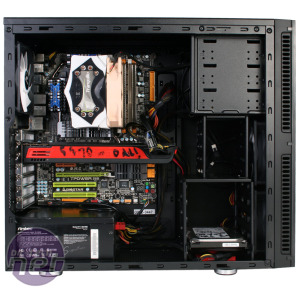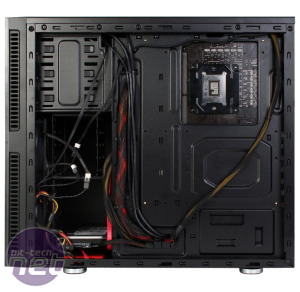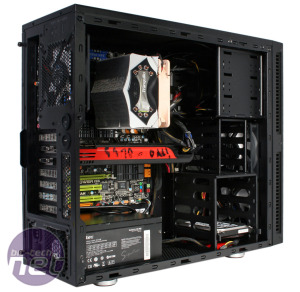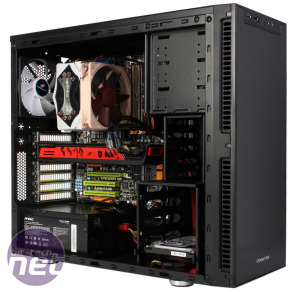
Performance Analysis
Unlike the Deep Silence fans in Nanoxia's cases, the audible difference between high and low speed with Cooltek's fans is very clear. At high speed, the case produces a hum that, while inoffensive, does leave something be desired from a quiet case. It also makes its CPU delta T result at this speed disappointing, as 57°C is beaten by the Deep Silence 1 and 2 as well as Fractal's Define R4, all of which are quieter at full speed. The same is true of the toasty GPU delta T result of 52°C. By comparison, the Deep Silence 2 also has two intake fans, non-removable drive cages and a mostly closed off front panel, but is able to trump this result by 3°C at its own maximum speed, where it is also noticeably quieter than the Antiphon.Switching to low speed results in sound levels that are far nicer. In fact, the fans are essentially silent at this speed as there's no discernible difference between this setting and having the fans off completely. Meanwhile, the case dulls the sound of our hardware considerably, although still not to the same degree as other cases. This pleasing sound reduction comes at a severe cost to system temperatures, however, as both our CPU and GPU shot up to the highest delta T values we've yet seen. The CPU surpasses the previous 'record' here by a whopping 7°C, as the piddling airflow from the rear fan is simply unable to deal with the heat of our overclocked chip, and likewise the GPU is basically left to its own devices.
We also tested the case with the three fans switched off since it's an option on the fan controller. A few minutes before the test finished, however, the system shut down to protect itself from overheating – the first time we've seen it do that. It's not really much of a point against the Antiphon, as with a heavily insulated case, zero external airflow and minimal ventilation, you can't really expect it to do much more than slowly cook your components into a computer casserole. With the supplied fans essentially silent on low speed as it is, however, it does leave us wondering why the off state has even been included, and we'd be cautious even letting a stock speed CPU sit idly in this case without any airflow whatsoever.
Efficient fans are everything in quiet cases, but Cooltek's models are simply too loud for their mediocre performance at high speed and, as the results show, drastically ineffective at their silent low speed. A fan control slider would help users find the best balance between sound output and airflow, but really it's clear that the fans themselves need work, as users in the market for a £60 chassis aren't going to want to shell out to replace the ones that come with the case.
Conclusion
From aesthetic and design perspectives, the Cooltek Antiphon is nice but doesn't bring anything new to the table. Other than the aluminium door, which we're big fans of, the look and feel of the case as well as the interior design and methods used to prevent sound escaping will be familiar to anyone who knows the chassis of companies like Fractal Design and Nanoxia. Nevertheless, with a fan control, USB 3.0, dust filters and sound proofing, its feature set is more than adequate for a sub-£60 case, while its materials and build quality is outstanding for the cost. Certainly a few compromises have had to be made (e.g. water-cooling), but the case is very easy to work and build with, and we always appreciate a case that stays focussed on its design objectives.The Antiphon may have numerous positives, but even though we give the quietest cases a little leeway in the cooling department, this area clearly needs some work, as the noise to performance ratio misses the standards set by other similarly designed cases like the Deep Silence 2. Variable speed fan control would help matters, as would removable drive cages, but it's the fans that need the upgrade most. If you're on a budget seeking a quiet system and aren't interested in heavy overclocking, the Antiphon will serve you very well, but our recommendation would be to save up some more for a Fractal R4 or Nanoxia Deep Silence chassis, as in the long run your cooler hardware will thank you for it.
-
Value19 / 20
-
Design25 / 30
-
Features15 / 20
-
Cooling14 / 30


MSI MPG Velox 100R Chassis Review
October 14 2021 | 15:04












Want to comment? Please log in.